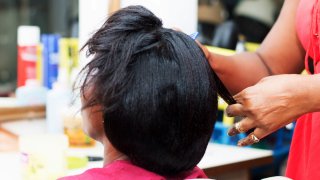
Women using chemical hair-straightening products are at a higher risk of uterine cancer than women who reported not using them, a new study by the National Institutes of Health found. Researchers noted that Black women may have a higher risk because they are more likely to use such products more frequently.
A group of researchers with the NIH’s National Institute of Environmental Health Sciences looked at the hair care habits of more than 33,000 women and found that those who used chemical hair straightening products at least four times a year were more than twice as likely to develop uterine cancer.
Researchers said chemicals like parabens, phthalates and fragrances in hair care products disrupt the endocrine system, which helps regulate hormones. That could, in turn, raise the risk of uterine cancer, the most common cancer of the female reproductive system.
“Sixty percent of the participants who reported using straighteners were Black women. The bottom line is that the exposure burden appears to be higher among Black women,” said Chandra Jackson, a participant in the National Institute of Environmental Health Sciences Earl Stadtman Investigators program, who co-authored the study.
Get top local stories in DFW delivered to you every morning. Sign up for NBC DFW's News Headlines newsletter.
Pressure to adhere to societal beauty standards that glorify and prioritize hair textures and styles associated with white people have led some Black people to rely on harmful hair care products like chemical relaxers to look the part, said Wendy Greene, a law professor at Drexel Kline School of Law who studies Black hair discrimination. She calls the pressure the “straight hair mandate,” noting that it can affect Black people’s work, social and educational lives.
Read the full story at NBCNews.com.

